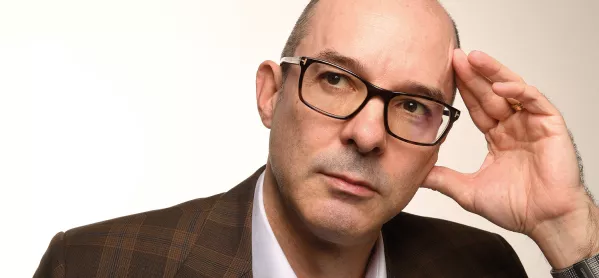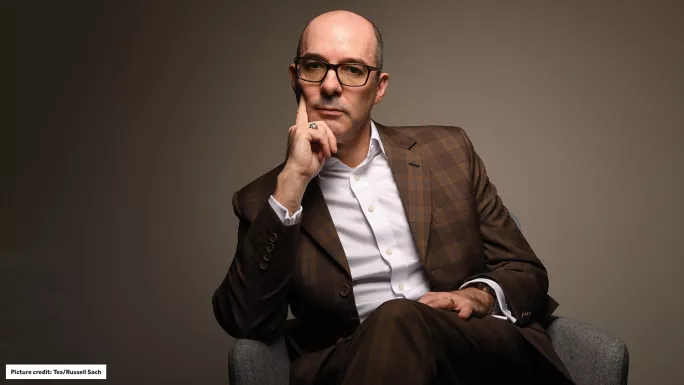- Home
- ‘We don’t want to be so careful in what we say that we end up saying nothing’
‘We don’t want to be so careful in what we say that we end up saying nothing’

“No system is 100 per cent reliable,” Daniel Muijs says. “That’s never possible.”
This is a standard line from a researcher. Roughly, it translates as the old academic cliché: “More research is needed.”
But Daniel Muijs is not only an academic. In January, he was appointed to the newly created role of head of research for Ofsted. The specific system he is commenting on, therefore, is school inspection.
“Obviously, a question that we have to always ask ourselves is: how valid and reliable are our systems?” he says.
His remit is twofold. On the one hand, he will use Ofsted’s resources to provide bird’s-eye reports on the education system, which can then inform the inspectorate’s work on school improvement. But he will also be looking at Ofsted’s internal processes, evaluating how well they function.
This raises questions about what would happen if his research were to highlight significant limitations in the way that Ofsted conducts its inspections. “Any substantive findings that we come up with would certainly feed through into the way that we are developing new frameworks and developing new training for inspectors,” he says.
Muijs has talked about the importance of acknowledging the limitations of any research conducted (go to bit.ly/MuijsPod to hear him talk about this). But this does not mean he wants to see Ofsted inspection reports that include a section highlighting their own limitations, in the same way that academic papers do.
“The first port of call is always to improve what we do, to solve the problem, rather than to say, ‘Oh, well, let’s keep doing the same thing and just say there is a problem with it,’” he says. “What we would do is try to improve what we are doing, if necessary.
“One of the differences between research we do here and academic research is that we do not have this kind of big time lag between findings and reporting. So, once we have the findings, that will feed in directly to the processes that we do.”
‘Differences between effectiveness’
Muijs is sitting in a boardroom in Ofsted’s new Westminster offices. His demeanour is decidedly academic: he speaks in slow, measured sentences, full of “is not” and “we have”, rather than “isn’t” and “we’ve”. He has a habit of answering questions while gazing into the middle distance, addressing statements to the wall opposite.
When not discussing work, however, he is personable and friendly, volunteering information about his life and background. He was born and educated in the Flemish part of Belgium. Along with the majority of Flemish Belgians, he attended a Catholic secondary school. “That was a modestly effective school, I would say,” he says, with a smile.
Belgium has an open-enrolment system for university, meaning that admission is not dependent on grades or exam results.
“So what you see is that a lot of kids go to university, and a lot of kids fail in the first year,” he says. “Then I noticed that kids from more effective schools found the transition to university a whole lot easier than I did.
“So that was really my first confrontation with differences between effectiveness within schools. That was a defining moment, yes.”
It sparked an interest in education; Muijs went on to write his PhD on the relationship between self-concept, media use and school attainment in primary pupils.
“One of the findings of the study we did was that actually media use did not affect their achievement, but what did was the school they went to,” he says.
“So, obviously, if you find that schools that kids go to make a significant difference and, if you find that that’s especially the case for kids from disadvantaged backgrounds, then obviously there is moral purpose there in saying we need to ensure all kids - and especially those from the most disadvantaged backgrounds - go to schools that give them the best possible start in life.”
In defence of Bold Beginnings
Of course, it is hard to hear the phrase “best possible start in life” from an Ofsted official without immediately thinking of Bold Beginnings, the report into the early-years curriculum that the inspectorate published at the end of last year.
The report sparked considerable controversy owing to its focus on the importance of formal lessons in the early years; many in the sector fear that it will encourage a shift away from play-based learning, towards four-year-olds sitting at desks.
Others have specifically criticised the research methodology behind the report, which focused on 41 high-performing schools. “The first thing to say there is that, actually, the methodology of that study is pretty sound,” Muijs says.
“I know there’s been quite a lot of criticism of the sampling, for example - people have said the sample is too small. Actually, when you look at the way schools were selected, we were very stringent.
“Also, of course, it is primarily qualitative research, and that’s actually a pretty large sample for a qualitative study.”
He does acknowledge that there are things that Ofsted could have done differently. He thinks it should have been clearer about the methodology involved. All Ofsted research reports will in future include a section on the methods used, as an academic paper would.
“But, overall, I have to say that I was happy with how it was done and the rigour with which it was conducted,” Muijs says.
So would the report have gone out under his watch? “What I would have done and what I will be doing is to say, ‘OK, this needs a methodology adding to it, so people understand more clearly what we’ve done.’ Because I think maybe that was missing.”
Muijs’ CV reads like the open-day itinerary of an ambitious sixth-former: taking in the universities of Warwick, Exeter, Manchester and Southampton. But he says that he has no concerns about the effect that working at Ofsted - where other priorities compete with those of the researcher - will have on his reputation.

“I feel that people here are very aware of the importance of ensuring that our research is robust, reliable and valid,” he says.
“There has been no discussion of powers of veto. Because I don’t think that’s necessary. Obviously, I will be involved in our research programme at all stages. I will obviously be part of the initial development of methodology, to ensure that it’s sufficiently robust at the start.
“In terms of analysis, and also in terms of report-writing, I will be involved in that process as well. So I don’t think there will be any requirement for vetoes, because it will be a process that we, as a research team, will be involved in from the start.”
Besides, he adds, even if there were debates over the content of a report, it would be nothing new to him: “Obviously, coming from an academic background, I’m used to having those kinds of debates because, as you can imagine, we are opinionated people. So there’s always those kinds of conversations ongoing.”
Academics are, however, nothing if not precise. So some of Ofsted’s previous statements - for example, former chief inspector Sir Michael Wilshaw’s sweeping comments about the underachievement of schools in the North of England - must surely have been like fingernails scraping down a blackboard.
“Obviously, I didn’t work here when Michael Wilshaw was here, so I can’t really comment on the evidence base for all the statements that were made at that point,” Muijs says.
“Of course, in order to effect change, it can be unhelpful to make too many statements about the subtleties of exactly the differences, say, between the schools in the North.
“We have to find a balance between clear communication and making sure that that is properly evidenced. But obviously we don’t want everybody to be so careful in what they say that you end up saying nothing.”
Muijs retains his PhD interest in technology in education; he also retains his early scepticism as to whether it actually makes a difference to pupils’ achievement. He denounced iPads in class as “fads”: teachers should be wary of jumping on to educational bandwagons, he said (see bit.ly/MuijsFad).
One of the fads
This is interesting, given that he has spoken out in favour of a “knowledge-rich curriculum”. That phrase, much-loved by schools minister Nick Gibb, surely has faddish elements: there is, after all, no consensus on what it actually means.
“Do people always mean the same thing by it? No. That’s probably as true equally as much for politics or people across the system as it is in schools. There are different definitions there.
“I think that’s true of both schools who claim a knowledge-rich curriculum and also schools who claim a skills-based curriculum, that there is variation in what people understand under those different terms.”
This returns him to his work at Ofsted: “We’ve had many years of quite prescriptive national curriculums. So the curricular freedom that schools now have is, I think, opening up a debate and thinking in that area.”
And curriculum is one of the areas that Ofsted chief inspector Amanda Spielman has chosen to prioritise.
“Curriculum is actually not the easiest thing to understand in education,” Muijs says. “Curricular thinking is one of the things that we, as a system, need to get better at, largely because schools have been disempowered in curriculum for quite a long time.
“One of the things that then, obviously, we need to look at is: OK, how are schools thinking about that?
“I think that we are living in a changing world, and I think that we are living in a world in which all public bodies are questioned as to the warrant of the statements they make. So, increasingly, I think all public bodies need to become research-informed, because otherwise you will be questioned as to where your statements are coming from.”
Keep reading for just £1 per month
You've reached your limit of free articles this month. Subscribe for £1 per month for three months and get:
- Unlimited access to all Tes magazine content
- Exclusive subscriber-only stories
- Award-winning email newsletters



